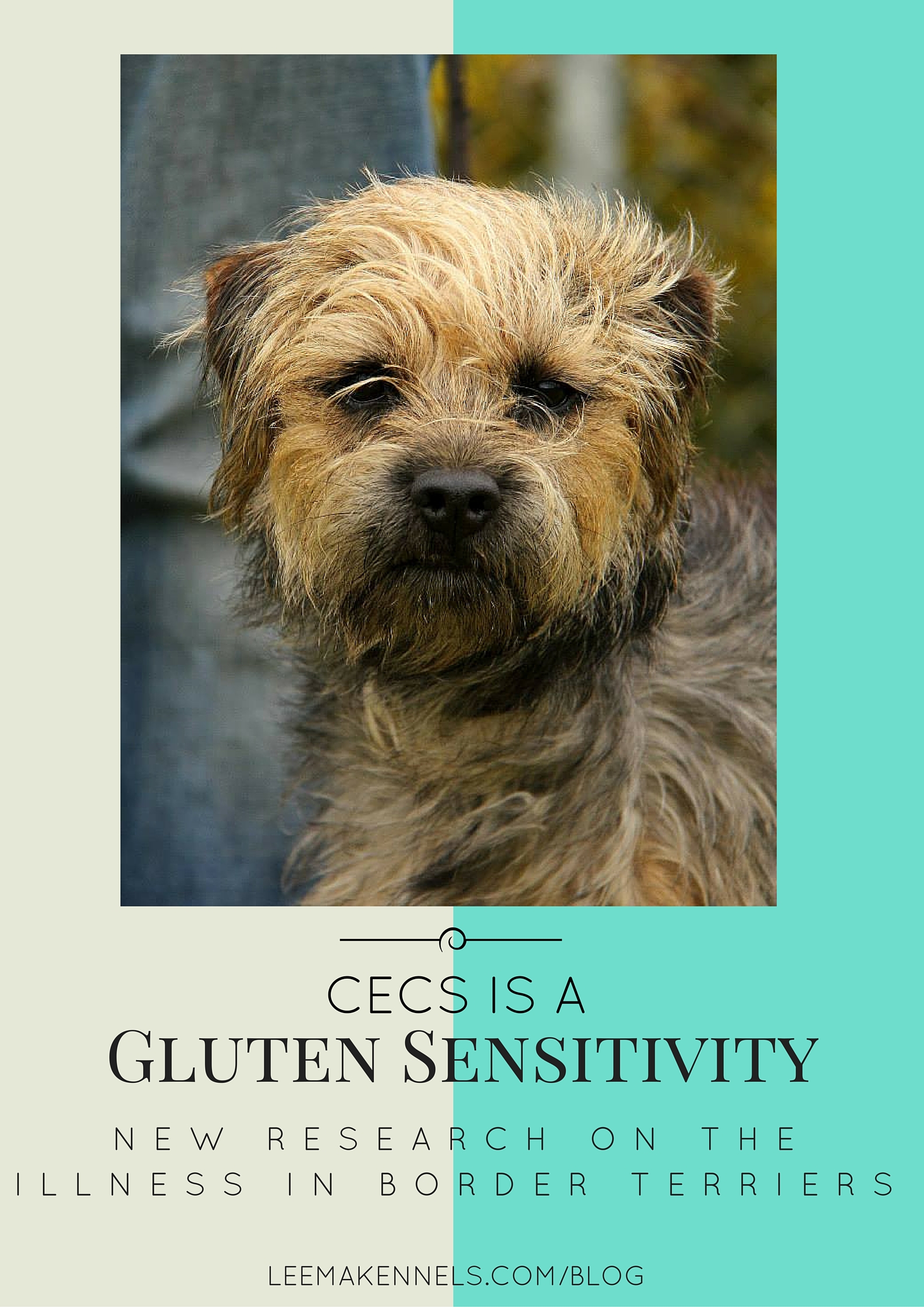The idea that CECS is a Gluten Sensitivity has been presented by recent research.
They were actually quite confident with the link between the two, saying in the research,
Canine epileptic cramping syndrome in [border terriers]s is a gluten-sensitive movement disorder triggered and perpetuated by gluten and thus responsive to a gluten-free diet.
This is pretty exciting stuff! CECS (short for Canine Epileptoid Cramping Syndrome, or sometimes called ‘Spike’s Disease’) is an unusual condition found almost exclusively in border terriers. These dogs are normal dogs except for when they have an ‘episode’ or a seizure. During an episode, the dog will ‘cramp up’. Typically, they remain conscious, but can’t walk, and sometimes appear worried following an episode.

Chip, a border terrier that does not have CECS
So far, there has been no real diagnostic test or explanation for the condition. In December 2013, a study looked at CECS, but it was an owner-survey, information-gaining exercise. Which is important, but doesn’t give us answers!
It was so important that it actually spurred this research. In the December 2013 study, 50% of dogs were found to ‘respond’ (i.e. have less episodes) on a gluten-free or hypoallergenic diet.
So now let’s welcome this lovely small study titled ‘The Clinical and Serological Effect of a Gluten Free Diet in Border Terriers with Canine Epileptoid Cramping Syndrome‘, which begins to look at how we can both diagnose and treat CECS. Exciting stuff!
The aim of the study was to work out if a gluten-free diet would effect dogs with CECS. Not only did the researchers want to know if the dogs stopped having episodes, but if their blood looked different with and without gluten. Naturally, they wanted to know if these things were correlated.
The dogs involved were 6 border terriers (an equal mix of male and female). Each dog:
- Had had CECS for at least 6 months
- Had been diagnosed with CECS via veterinary observation (including video)
- Had had at least 2 CECS episodes
- Had not tried gluten-free diets before
For interest sake, the average age of onset for CECS in this small sample was 2.6 years.

Winnie, another border terrier who does not have CECS
Once recruited, the dogs had blood taken and the owners were given instructions for the dog going on a total gluten-free diet (Hypoallergenic Canine Dry from Royal Canin). The dog underwent a general physical examine (and some dogs went through more intensive procedures, owners consenting) and all were determined to be healthy, beyond the presentation of CECS.
The blood was again taken at 3, 6, and 9 month periods.
The blood was tested for antibodies which are considered important in diagnosing gluten sensitivity in humans.
The blood of non-CECS border terriers was also taken and tested.
The owner was asked to keep a record of the incidents of CECS in their borders.
Are you ready for the results? They’re pretty compelling.
So all that changed in these border terriers’ lives was that they were put on a completely gluten free diet. With this one change, all of the borders terriers, when they adhered to the gluten free diet, stopped having seizures within 4 weeks. Three dogs did not have seizures at all once they started the diet.
Two dog owners, upon completion of the trial, accidentally fed their dogs treats with gluten… And the dogs had seizures again. So not only did a gluten free diet stop seizures, the reintroduction of gluten caused seizures.
Now let’s talk about “Dog 6”. Dog 6’s owner is the epitome of why these kind of studies, where dogs are left with their owners, are hard work! Throughout the study, Dog 6 was a dog that continued to have seizures. Dog 6’s owner presumably fed the dog the gluten free diet, but then allowed the dog to continue to graze on horse poo when out and about. This issue wasn’t identified until late in the study and so Dog 6 was excluded from the serum results listed in this article. However, when Dog 6’s owner actually did was they were told and stopped the horse poo eating, Dog 6 stopped having seizures too! When Dog 6’s blood was tested 3 months after the study ended (but 3 months into the owner actually doing it right), that dog’s blood results was consistent with the other dogs, and it too had ceased having episodes.
Why is this study such a big deal?
Up until now, we have had no way to diagnose nor treat CECS. (In fact, one of the criteria established in the 2013 study of CECS indicated that if a dog fails to respond to epilepsy medication then it probably is CECS. Nice to know, but not a great deal of help.)
The blood results from these dogs showed high levels of relevant antibodies in affected dogs while they consumed a diet with gluten. The presence of gluten-associated antibodies could be used to diagnose CECS.
Clearly, a treatment has been identified too: avoid gluten!
Other areas that are of interest:
- Signs of gastrointestinal upsets could be a sign of gluten problems, or of future CECS. Vomiting, soft stools, or belly grumbling was reported in 2 of the dogs featured in this study. The presentation of belly problems and CECS together can be an indication of just one problem – gluten sensitivity!
- The story of ‘Dog 6’, to me, really shows the importance of owners in being vigilant. I feel that many dog owners take a rather lazy approach to food elimination diets, but elimination means to completely remove. If you don’t completely remove, you can’t say that it’s been tried!
- In humans, celiac disease has sometimes been associated with a rash… Which makes me think back to the correlation between CECS and skin-conditions in borders identified in the 2013 study.
Another quote from the study:
These investigations support the hypothesis that CECS is a manifestation of gluten sensitivity, making this the first [sudden onset] movement disorder in veterinary medicine with a serological link to gluten.
What research from here?
This is a very small study, and it’s important that we do more research before making solid conclusions. This study itself suggests further research:
- With a larger sample size
- More research into the correlation of gastrointestinal upsets and CECS
- A double-blind randomised placebo-controlled trial
But in the meantime, while we’re waiting to know more, these researchers (and I!) recommend that, if you have a border terrier with CECS, you switch the dog to a diet that eliminates all gluten foods.
Reference:
Lowrie M, Garden OA, Hadjivassiliou M, Harvey RJ, Sanders DS, Powell R, & Garosi L (2015). The Clinical and Serological Effect of a Gluten-Free Diet in Border Terriers with Epileptoid Cramping Syndrome. Journal of veterinary internal medicine / American College of Veterinary Internal Medicine, 29 (6), 1564-8 PMID: 26500168
Further reading:
Gluten Sensitivity Triggers Epileptoid Cramping Syndrome in Border Terriers


Hi Tegan – I can’t help but think this is all very “convenient” to label CECS dogs as being gluten intolerant. It’s very trendy too! There is no way to diagnose CECS so how did they know the dogs had it? Symptomatic maybe?
That’s just the cynical side of me though. I’m not a scientist…..
Presumably it is still a genetic disease passed on from generation to generation, and that the gluten free diet might be a way to ease the symptoms? We still need a test for it? Is that what they are saying?
I speak as someone who has owned a CECS-symptomatic dog for 12 years. He has been on varying diets in his life for one reason or another and I can say that I have never noticed his seizures come or go according to what he has been eating (and I do keep records of his seizures and circumstances surrounding them in an effort to pin down triggers).
So I guess this work is a start, but it will be a wonderful day when we finally have a test for this horrible syndrome.
Hi Julia,
The dogs were determined to ‘have CECS’ by the owners presenting a video to the vets involved in this study. So, they were based to have CECS from showing symptoms of CECS, and by having at least two episodes (by owners accounts).
I think it’s probably a dietary intolerance that has a genetic inheritance. I wouldn’t be surprised if only certain diets ‘bring out’ CECS – so, a dog might /have/ CECS, but we never see symptoms because the dog is never fed the dietary trigger.
The last study was less specific than this one. The last study (2013) had 50% of owners say that their dogs seemed to be better on gluten free or hypo-allergenic diets. Colloquially (non-scientifically), I have heard a lot of people seem to express the idea that their dogs are better with certain diets.
The story shown here of ‘Dog 6’ is a good story to illustrate how limiting a gluten-free diet needs to be. Not only does the primary food need to be gluten free, as does all treats, meals of other pets (if shared), any human scraps given, etc. When a dog goes for a walk and snuffles up a sandwich or eats bird seed, then they can be exposed to gluten then, too. It’s actually pretty hard, practically, to ensure a dog does not encounter gluten. Furthermore, some dogs took up to 4 weeks to cease showing symptoms, so maintaining this level of vigilance long term is probably difficult for many owners.
The blood tests used in this study, if CECS is ‘just’ a gluten intolerance, will be able to determine if a dog is affected or not. I don’t know specifically how long gluten antibodies exist in a dog’s system, but it would be a matter of feeding a dog gluten, ensuring that they have a blood test that looks for that antibody, and then being able to determine that they have the antibodies present or not. If they have the antibodies, they’re ‘gluten sensitive’. In this study, the 9 non-CECS border showed no antibodies – it was only CECS-affected dogs that showed these antibodies in their blood. (But the CECS-affected dogs only showed antibodies in their blood when exposed to gluten – these levels dropped over the course of the study as the body ceased to produce antibodies as no new gluten was entering the system.)
The biggest problem with this study is that it only tested 15 border terriers in total (combined – CECS and non-CECS), therefore a bigger study with 50+ dogs is needed to give certainty to the results.
Hi Leema,
My Border, Duke, born in 2004, had infrequent seizures until about 2008, never knew it was CECS at that time. In 2008, I began feeding a commercial raw diet. In about 2012, the raw company changed their sourcing of “something” in the raw diet, because it no longer worked for Duke. They told me thier “recipe” was the same, but would not discuss their sourcing with me, obviously their sourcing change because he was having seizures daily…really horrible. This was when we discovered CECS, and my Vet verified he had it. My sister, who has many sensitivities herself (and coincidentally has prepared raw and fed raw to her dogs for years), helped me prepare a raw diet myself. He still had infrequent seizures….we went one step further and eliminated feeding animals that ate soy, that seemed to be the trigger for Duke. It was a total trial and error issue, with many notes and adding one food back at a time (just as my sister had done to eliminate her food induced migraines). Duke just turned12 and has been seizure free for 3+years. He eats almost all (dog safe) veggies, and fruits, his protein is either grass fed lamb or soy free chicken, pure yogurt and soy free eggs…so you see no gluten either.
I can’t believe he is 12, or that at one time I was thinking of putting him down, but when you see several seizures in one day it is unbearable for owner and dog! We believed the seizures to be linked to diet, considering gluten and processed proteins as a starting point…just thinking about what canines eat in the wild…no flour, no cooked down protein. Interestingly, I gave him some raw sunflower seeds once early in our trials and that put him into a seizure. That let us to dukes seizures being tied to processed protein, which led me to the raw diet. But whatever it really is, this diet works for him. I am SO THANKFUL, research is progressing on CECS. Borders are such funny little creatures, and so full of life, a simple diet change would be so welcomed by those with suffering dogs!
Thank you for this forum! Please keep letting people know about what is happening with CECS out there!
Thanks for sharing your experiences, Laura. I’m pleased that Duke is doing well. 🙂 While your story (and others I have heard) makes CECS seem a lot more complicated than this research indicates, I am so happy to have any research, and I look forward to more!